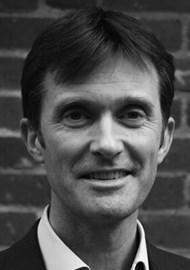Christopher Aldren
Consultant Otolaryngologist, Wexham Park Hospital, UK.

Chris playing at Cambridge garden party 2003.

Chris with wife and sons Tom and Alex in family quartet.

Chris leading the Doctors Orchestra at the Cadogan Hall in London.
Christopher Aldren, Consultant Otolaryngologist, Wexham Park Hospital, UK. My three older siblings all played the violin, so it seemed natural that at the age of six, I should also start to have violin lessons. Whilst at school, I won a national chamber music competition and represented the UK in a European competition. I led university orchestras in Cambridge and London, as well as having the opportunity to play a variety of violin concertos. I now play in the European Doctors Orchestra which I would thoroughly recommend to any orchestral musician.
I am fortunate to be on the advisory board of the London Philharmonic Orchestra and am also their ENT surgeon. Perhaps my greatest musical good fortune was to play in the Haydn Chamber Orchestra in London where I met my Norwegian violinist wife. We performed the Bach double violin concerto together in the Anglican Cathedral at the Liverpool BACO in 2009. We have three boys, all of whom are young professional musicians as operatic tenor, violinist and clarinettist.
Arnie Maran
Retired surgeon. Now a writer, golfer, curler, musician and a professional consumer of pasta and wine in the hills of Umbria, Italy.

Arnie (middle) playing a gig in the palm house of the Royal Botanic gardens:
“We play under the name of TOGS— three old guys!”
After years of perfecting Mozart and Beethoven sonatas, I realised that however well I played them, about a million people in the world could play them better, so I turned to jazz. The improvisations might not be very good but at least they are personal and there is the pleasure of creation. Jazz was my drug.
During the years of a hectic professional life, our weekly gig in a pub acted as my valium and now in the years of retirement, our occasional gig is my amphetamine. I’ve played trumpet in many traditional bands, but now settle for gentle jazz on the keyboard with my trio, whose combined ages add up to a total of 235!
Dave Strachan
ENT Consultant, Braford Royal Infirmary, UK.



A painting by local artist Alan Flood of Dave Starachan’s former band, Black Dog Blues.
www.alanflood.com
Staggering back from the pub as an 18-year-old and flipping through the three TV channels (well, it was 1981!), I came across ‘Muddy Waters Live’ and was totally mesmerised!! Blues became my ‘thing’ and, 10 years later as an ENT Registrar, I decided to try the harmonica (a key instrument in the slow blues that I love). So I bought a book and a 10 hole ‘diatonic Blues Harp’ and taught myself by playing along to tracks. By coincidence, I met a few other (mainly medical) guys forming a band and so, over the past 20 years, have ended up playing regular live music. Perhaps even more fun, is that I always take a couple of harps with me to meetings / trips abroad.
Most live blues / rock bands seem to like a guest slot from a guy from England, so I’ve played many times on stage with various local bands around the world! Why do I love it? Unlike chromatic harmonicas, the diatonic ‘harps’ are easy to play and there’s no written annotation – you just play by feel. The ‘ballsy’ blues sound comes from ‘bending’ the suck notes in the lower half of the harp. It’s great fun and certainly is a great escape from the day job!
Declan Costello
Consultant ENT Surgeon, Queen Elizabeth Hospital, Birmingham, UK.

Declan singing with the Oxford Bach Soloists.
Having been a treble as a boy in school choirs, I really enjoyed singing, but I didn’t have any aspirations to have a career in music. But when my voice broke, I did more and more singing, and it turned out that I had a reasonable countertenor (falsetto) voice. I ended up studying music at St John’s College, Cambridge, but I decided halfway through my music degree that I wanted to study medicine.
So after I had completed my music degree, I went to Imperial College. With a background as a singer, the subspecialty of laryngology seemed like an obvious choice! I continue to sing whenever time allows, and my voice has slipped down to the tenor register. For me, music provides a wonderful space in which my mind and body can function in a completely different way to medical work.
Michael Kuo
Consultant Otolaryngologist, Head and Neck Surgeon, The Westbourne Centre, Birmingham, UK.

BACO Liverpool Anglican Cathedral, 2009. Declan Costello, Michael Kuo, Huw Williams, Graeme Smelt,
Suzie Jervis, Nicholas Kay, Chris Aldren, Paul Glossop plus family and colleagues.
I had always wanted to be a musician but, although my mother was a piano teacher, a career in music was never really going to be acceptable without a proper degree under my belt and I thought medicine would be the ‘least worst’ option. The first thing I did after graduating from medical school was to enrol in George Hurst’s conducting class at the Canford Summer School of Music. My late boss, Tom Low-Beer, was bemused that his houseman would have the cheek to ask for the first two weeks of August off to attend a conducting class!
What Canford taught me was that the risks and uncertainties of a career in music outweighed my passion for music, a passion I consoled myself could be satisfied as an amateur. I still wonder, sometimes, if it will be possible to pursue a second career in music after retirement from surgery. In the meantime, I have been an unashamed musical tiger father to my children and also participated in ad hoc performances, such as those with my ENT colleagues at BACO 2006 in Birmingham and BACO 2009 in Liverpool Cathedral.





